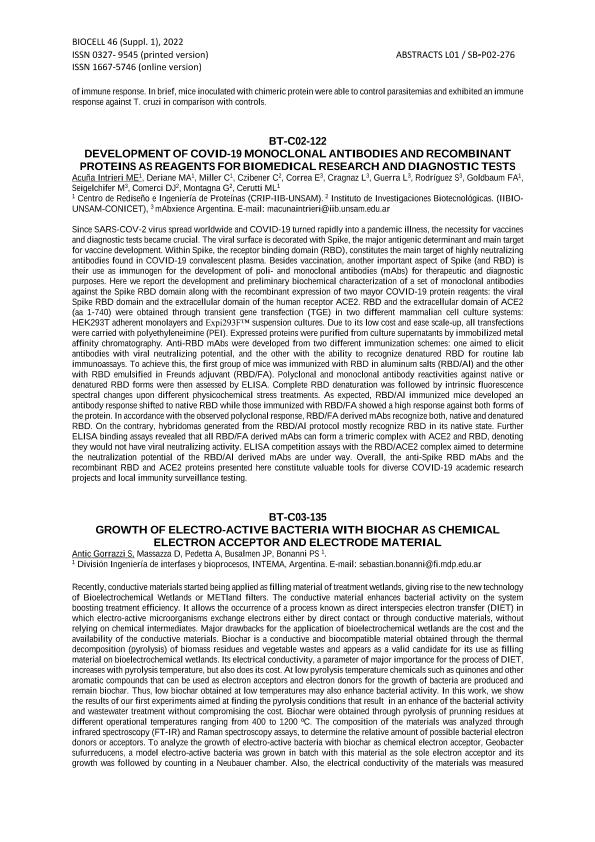Evento
Development of COVID-19 monoclonal antibodies and recombinant proteins as reagents for biomedical research and diagnostic test
Acuña Intrieri, M. E; Deriane, M.A; Miller, C.; Czibener, Cecilia ; Correa, E.; Cragnaz, L.; Guerra, L.; Rodriguez, S.; Goldbaum, F.A.; Seigelchifer, M.; Comerci, Diego José
; Correa, E.; Cragnaz, L.; Guerra, L.; Rodriguez, S.; Goldbaum, F.A.; Seigelchifer, M.; Comerci, Diego José ; Montagna, Georgina Nuri
; Montagna, Georgina Nuri ; Cerutti, Maria Laura
; Cerutti, Maria Laura
 ; Correa, E.; Cragnaz, L.; Guerra, L.; Rodriguez, S.; Goldbaum, F.A.; Seigelchifer, M.; Comerci, Diego José
; Correa, E.; Cragnaz, L.; Guerra, L.; Rodriguez, S.; Goldbaum, F.A.; Seigelchifer, M.; Comerci, Diego José ; Montagna, Georgina Nuri
; Montagna, Georgina Nuri ; Cerutti, Maria Laura
; Cerutti, Maria Laura
Tipo del evento:
Congreso
Nombre del evento:
LVII Annual Meeting of the Argentine Society for Biochemistry and Molecular Biology Research y XVI Annual Meeting of the Argentinean Society for General Microbiology
Fecha del evento:
01/11/2021
Institución Organizadora:
Sociedad Argentina de Investigación Bioquímica y Biología Molecular;
Asociación Civil de Microbiología General;
Título de la revista:
Biocell
Editorial:
Sociedad Argentina de Bioquímica y Biología Molecular
ISSN:
0327-9545
Idioma:
Inglés
Clasificación temática:
Resumen
Since SARS-COV-2 virus spread worldwide and COVID-19 turned rapidly into a pandemic illness, the necessity for vaccines and diagnostic tests became crucial. The viral surface is decorated with Spike, the major antigenic determinant and main target for vaccine development. Within Spike, the receptor binding domain (RBD), constitutes the main target of highly neutralizing antibodies found in COVID-19 convalescent plasma. Besides vaccination, another important aspect of Spike (and RBD) is their use as immunogen for the development of poli- and monoclonal antibodies (mAbs) for therapeutic and diagnostic purposes. Here we report the development and preliminary biochemical characterization of a set of monoclonal antibodies against the Spike RBD domain along with the recombinant expression of two mayor COVID-19 protein reagents: the viral Spike RBD domain and the extracellular domain of the human receptor ACE2. RBD and the extracellular domain of ACE2 (aa 1-740) were obtained through transient gene transfection (TGE) in two different mammalian cell culture systems: HEK293T adherent monolayers and Expi293 suspension cultures. Due to its low cost and ease scale-up, all transfections were carried with polyethyleneimine (PEI). Expressed proteins were purified from culture supernatants by immobilized metal affinity chromatography. Anti-RBD mAbs were developed from two different immunization schemes: one aimed to elicit antibodies with viral neutralizing potential, and the other with the ability to recognize denatured RBD for routinary lab immunoassays. To achieve this, the first group of mice was immunized with RBD in aluminium salts (RBD/Al) and the other with RBD emulsified in Freunds adyuvant (RBD/FA). Polyclonal and monoclonal antibody reactivities against native or denatured RBD forms were then assessed by ELISA. Complete RBD denaturation was followed by intrinsic fluorescence spectral changes upon different physicochemical stress treatments. As expected, RBD/Al immunized mice developed an antibody response shifted to native RBD while those immunized with RBD/FA showed a high response against both forms of the protein. In accordance with the observed polyclonal response, RBD/FA derived mAbs recognize both, native and denatured RBD. On the contrary, hybridomas generated from the RBD/Al protocol mostly recognize RBD in its native state. Further ELISA binding assays revealed that all RBD/FA derived mAbs can form a trimeric complex with ACE2 and RBD, denoting they would not have viral neutralizing activity. ELISA competition assays with the RBD/ACE2 complex aimed to determine the neutralization potential of the RBD/Al derived mAbs are under way. Overall, the anti-Spike RBD mAbs and the recombinant RBD and ACE2 proteins presented here constitute valuable tools for diverse COVID-19 academic research projects and local immunity surveillance testing.
Palabras clave:
MONOClONAL ANTIBODY
,
RBD
,
HEK
,
COVID-19
Archivos asociados
Licencia
Identificadores
Colecciones
Eventos (IIBIO)
Eventos de INSTITUTO DE INVESTIGACIONES BIOTECNOLOGICAS
Eventos de INSTITUTO DE INVESTIGACIONES BIOTECNOLOGICAS
Eventos(SEDE CENTRAL)
Eventos de SEDE CENTRAL
Eventos de SEDE CENTRAL
Citación
Development of COVID-19 monoclonal antibodies and recombinant proteins as reagents for biomedical research and diagnostic test; LVII Annual Meeting of the Argentine Society for Biochemistry and Molecular Biology Research y XVI Annual Meeting of the Argentinean Society for General Microbiology; Virtual; Argentina; 2021; 1-1
Compartir



